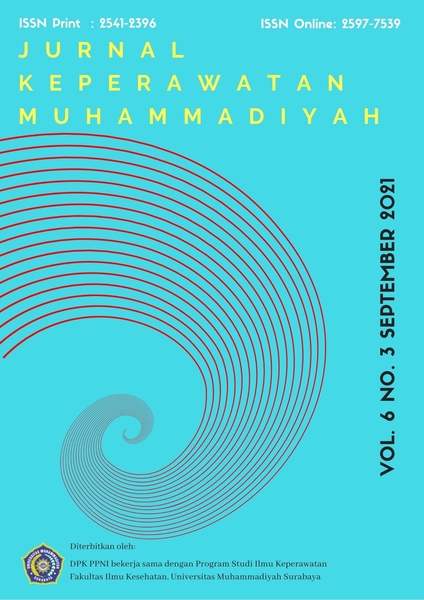Hubungan Dukungan Keluarga Dengan Kejadian Stress Pada Lansia Diabetes Mellitus Tipe 2 Di Wilayah Kerja Puskesmas Kota Batam
DOI:
https://doi.org/10.30651/jkm.v6i3.8897Keywords:
Family Support, Stress, Diabetes MellitusAbstract
Â
Korespondensi
Â
Â
Keywords: Â Â Family Support, Stress, Diabetes Mellitus
Objective: To identify determine the relationship of family support with stress events in elderly people with type 2 diabetes mellitus.
Methods: This article uses analytical research with cross sectional design of 65 elderly in the Sekupang Health Center Work Area. The implementation time for 7 days starts on 4-10 June 2020. Sampling using a purposive sampling technique. The measuring instrument in this study was a questionnaire HDFSS and PSS. Analysis of the data used is the Chi-Square Test.
Results: The results shows that there is a relationship between family support and the incidence of stress in elderly people with type 2 diabetes mellitus in the work area of Sekupang Health Center (p value 0.002) α = 0.005). It is hoped that elderly families can provide good family support so as not to cause mild stress events in the elderly with type 2 diabetes mellitus.ÂConclusion: (a) Most of the elderly with type 2 diabetes mellitus did not receive family support with mild stress, amounting to 28 elderly (43.1%). (b) Most of the elderly with type 2 diabetes mellius experienced severe stress events with less supportive family support, amounting to 9 elderly (13.8%). (c) There is a significant relationship between family support and the incidence of stress in the elderly with type 2 diabetes mellitus in the work area of the Sekupang Health Center, Batam City in 2020, with the Chi-Square statistical test obtained a P-value of 0.002 <0.05.
References
Erda, Roza; Fathiqah Nurul Jannah; Yunasp, D. (2018). HUBUNGAN GANGGUAN FUNGSI KOGNITIF DENGAN RESIKO JATUH PADA LANSIA DI WILAYAH KERJA PUSKESMAS TANJUNG BUNTUNG TAHUN 2018. PROSIDING SEMINAR NASIONAL APLIKASI SAINS DAN TEKNOLOGI (SENASTEK), 226–229.
Luecknotte & Meiner. (2006). Gerontologi Nursing. Mosbyyears book.inc.
Muhith, A. (2016). Pendidikan Keperawatan Gerontik. CV Andi.
Nabyl, R. E. (2009). Cara Mudah Mencegah dan Mengobati Diabetes Mellitus. Aulia Publishing.
Nwanko C.H., Nandy B., N. B. . (2010). Factors influenching diabetes management outcome among patients attending government helath facilities in South East. International Journal of Tropical Medicine, 5(2), 28–36.
Roza Erda, Fitria Tamara, Trisya Yona, D. Y. (2020). Indonesian Journal of Global Health Research. 2(4), 343–350.
WHO Global Report on Diabetes. (2016). Global Report on Diabetes. Isbn, 978, 6–86. https://sci-hub.si/https://apps.who.int/iris/handle/10665/204874%0Ahttps://apps.who.int/iris/bitstream/handle/10665/204874/WHO_NMH_NVI_16.3_eng.pdf?sequence=1%0Ahttp://www.who.int/about/licensing/copyright_form/index.html%0Ahttp://www.who.int/about/licens
Yusuf S. (2004). Psikologi Perkembangan Anak dan Remaja. PT. Remaja Rosdakarya
Downloads
Published
Issue
Section
License
- Penulis tetap memegang hak atas karyanya dan memberikan hak publikasi pertama kepada jurnal ini yang secara simultan karya tersebut dilisensikan di bawah:Â Creative Commons Attribution-ShareAlike 4.0 International (CC BY-SA 4.0)













